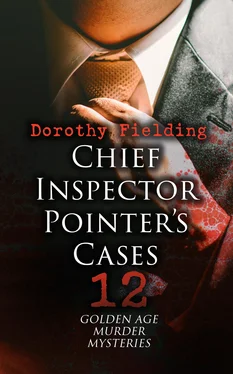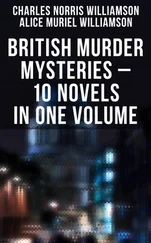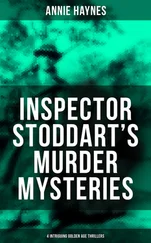Pointer saw that there was nothing for it but the truth.
"It's this way. Suppose you wished afterwards you'd put things differently, mightn't it worry you? I don't think it would be quite fair to you, just because you and Mr. Vardon are engaged."
She said no more, and left them. It might seem a dreadful thing of which to suspect a nice girl, but the Chief Inspector would have been unwilling to bet on the point, so certain did it seem to him, that outside, with her ear against the door jamb, Miss Ash would have been found.
"How long has Miss Ash been engaged?"
Now that was just the question at issue between Barbara and her parents. Sir Richard always attributed it to the wonderful intuition of woman that Barbara hugged him quite especially that night. He replied:
"She tells us that they became engaged about a week ago. They intended to keep it to themselves till the young man should have a more assured future."
"You have no objections to the match?"
"Apart from his lack of means, none at all. I like Philip Vardon. He's been very unfairly treated in the past, to my thinking, and taken it splendidly."
"You mean?"
"His Cousin Branscombe's will. Philip Vardon should have had the land left him. Every foot of it was Vardon. It came to Clive Branscombe through his mother. But he was one of those men whom a handsome, imperious woman can twist around her little finger. And Mrs. Tangye, poor soul, was both those things."
"Otherwise a nice woman?"
"Most certainly."
"Ever anything against her? Hint of scandal, or that sort of thing?"
"Not a breath."
"Did she strike you as a very, how shall I put it—lawabiding woman? I mean, do you think she would ever lend herself to anything illegal in any way?"
Pointer was thinking of blackmail.
"The last woman in the world," Sir Richard assured him with a smile, and very definitely.
"Or to be mixed up in anything illegal?"
"Or to be mixed up in anything not strictly above-board, and most respectable. In fact her respectability—I should say—was a shield and buckler nothing could get past."
He tried Ash on another tack, but Sir Richard knew personally nothing of Mrs. Tangye's cousin, nor of her inner life since she had married her present husband.
Pointer thanked him and had risen to go. Turning to him again he said civilly:
"Miss Ash has a bad cold, I see. I'm afraid it's a legacy from the funeral yesterday."
"No. She's getting over an old one. Though I always say that I don't know about weddings, but one funeral is sure to make another. Yet in her case, it seems to've done no harm."
Pointer hoped that the architect's saw would come true in this case. He certainly intended to do his best to see that Mrs. Tangye's funeral should be followed by another—that of her murderer.
The Chief Inspector found Wilmot at the police station, chatting to Haviland.
"Vardon's alibi is rotten." Haviland spoke cheerfully. "As for his box-camera he says he sold it to a man he met in the train a month ago for a fiver. Hard up for an excuse! In fact, he fits the theory we now have of the murder to a T, sir."
"All but the preparations on Mrs. Tangye's part for his unseen arrival," Pointer said in his unmoved way. "A most important 'but,' Haviland. Otherwise, I agree that he fits, supposing his story to be false. For obviously Mrs. Tangye wouldn't have gone openly to the man's room who, a couple of hours' later, was to come so secretly to Riverview, in order to hand him a sum of money she could just as easily have given him at her own house."
"Hence the yarn, you think?" Haviland asked.
"Possibly. But on the other hand, if Vardon's telling the truth, and she did go to Fulham, did give him the money to use for them both, the account he gives of her fits in with what we know of the rest of Mrs. Tangye's actions last Tuesday. Her rush would be not to be too late for that most important appointment in the Riverview morning-room. An appointment for which she had prepared so well. The distrait manner which Vardon mentions would be due to it. So on the whole, until we learn of something that shakes his story, or that would explain why he should be expected to come by the French windows, and not by the front door, I accept it."
"What he told you fits in most of all with suicide," Wilmot reminded him.
Pointer shot him an ironic glance.
"I don't see the Insurance Company's advocate seeing it, if it didn't."
"Any more than I can see a crime here—yet," Wilmot said seriously. "That little point he told you about Mrs. Tangye picking up her pen with her left hand shows what happened. She fired that shot too with her left hand. Or she had an accident while holding it in her left hand. Vardon's no criminal. Apart from every moral consideration, he hasn't the brains for such a crime as you're postulating."
And here Pointer rather agreed. Though with reservations. Criminals have odd pockets of cunning, which even a trained eye may overlook in a first summing up of their character.
Haviland glanced up from his papers.
"I tried that speech of yours on the tea-room manageress. She crumpled."
"What rune was this?" Wilmot asked. "Does Pointer go in for incantations? Pray lend it to me. I'm off to see my tailor."
But Pointer, it seemed, had only told Haviland to ask if it were true, as Miss Saunders maintained, that she had been wearing a purple cloak on Tuesday. The manageress had fallen into the trap, and said that she had been.
"The more I seemed to doubt Miss Saunders having really worn that cloak—she hasn't such a thing in her wardrobe, of course—the more the woman remembered it. Well, of course, that does for the alibi. Once a liar always a liar. And that's a fact. The two women have put their heads together, and concocted it. That's what happened. As a matter of fact, I don't believe now that Miss Saunders was either at the tea-rooms or in the library last Tuesday afternoon between four and six."
Haviland looked half-uneasy at the boldness of his own thoughts, but Wilmot and Pointer only nodded, as though each had already reached that point some time ago.
Barbara meanwhile was discussing the man in charge of the case with her grandfather.
"Looks to be a bit off-colour," Dorset Steele said moodily. He was sitting with his latest stamp between his fingers. The solicitor collected.
"Does he?" in tones of horror.
"Don't you think so?" He held out a Sandwich Island gem. Barbara covered it promptly with the ash tray. A present from herself, which the solicitor regularly produced during her visits, and which he as regularly forgot to use.
"I'm speaking of the Chief Inspector from Scotland Yard. He seems so tied by what he calls routine."
"Huh!" snorted Dorset Steele, almost blowing the stamp off the table. "Routine, indeed! that's what he called his work in that Mailing affair last year. Would Mailing have come out with the truth and ruined our whole defence if Pointer hadn't—" Dorset Steele broke off too indignant to continue, though Barbara heard a muttered "Bottle of ginger-beer indeed! Our best witness!" Snatching up a lens, the solicitor examined a purchase viciously.
"He's a good man," he admitted finally, grudgingly. "His evidence always carries tremendous weight with any judge and jury."
"I'm going to go to the hotel in the city where Phil went, and I'm going to hunt there for that bag of his," Barbara said suddenly. "Of course it's there. He says he saw it taken in by one of the lift-boys. I'm sure I can find it. He pretends now that he doesn't want me to bother. That it's not worth finding, but that's only to save me worrying."
Dorset Steele was sure she could not find it. Pointer had telephoned to him only a little while ago, that two of Scotland Yard's men had failed to trace it. He knew, though Pointer had rung off, that the Yard were searching taxis and left-luggage places. But he thought any diversion good for Barbara.
Читать дальше












